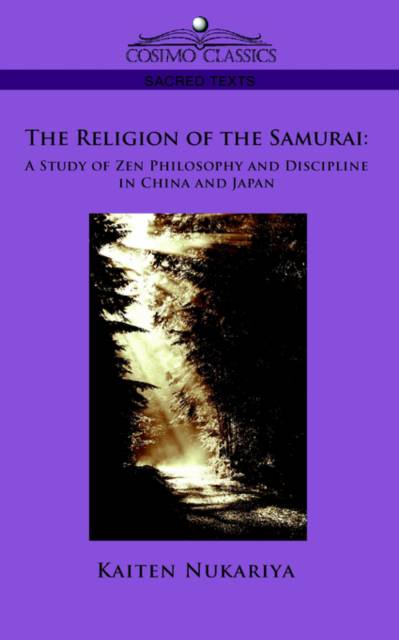
Door een staking bij bpost kan je online bestelling op dit moment iets langer onderweg zijn dan voorzien. Dringend iets nodig? Onze winkels ontvangen jou met open armen!
- Afhalen na 1 uur in een winkel met voorraad
- Gratis thuislevering in België vanaf € 30
- Ruim aanbod met 7 miljoen producten
Door een staking bij bpost kan je online bestelling op dit moment iets langer onderweg zijn dan voorzien. Dringend iets nodig? Onze winkels ontvangen jou met open armen!
- Afhalen na 1 uur in een winkel met voorraad
- Gratis thuislevering in België vanaf € 30
- Ruim aanbod met 7 miljoen producten
Zoeken
The Religion of the Samurai
A Study of Zen Philosophy and Discipline in China and Japan
Kaiten Nukariya
Paperback | Engels
€ 29,95
+ 59 punten
Uitvoering
Omschrijving
Now the question arises, If all human beings are endowed with Buddha-nature, why have they not come naturally to be Enlightened? To answer this question, the Indian Mahayanists told the parable of the drunkard who forgets the precious gems put in his own pocket by one of his friends. The man is drunk with the poisonous liquor of selfishness, led astray by the alluring sight of the sensual objects, and goes mad with anger, lust, and folly. Thus he is in a state of moral poverty, entirely forgetting the precious gem of Buddha-nature within him. -from "The Nature of Man" There are, unknown to many Western minds, two schools of Buddhist thought: the Theravada, the one Westerners are generally more familiar with, and the Mahayanistic, or Zen, philosophy, which is still a great mystery even to occidental explorers of world religions. This 1913 book, one of the first works on Zen written in the English language, examines the Zen mode of meditation, which is virtually unchanged from the practices of the pre-Buddhistic recluses of India, and discusses the intensely personal aspects of this branch of Buddhism, which stresses the passing of wisdom through teachers rather than Scripture. Ardently spiritual and beautifully reflective, this splendid book will be treasured by all seekers of the divine. KAITEN NUKARIYA was a professor at Kei-o-gi-jiku University and So-to-shu Buddhist College, Tokyo.
Specificaties
Betrokkenen
- Auteur(s):
- Uitgeverij:
Inhoud
- Aantal bladzijden:
- 272
- Taal:
- Engels
Eigenschappen
- Productcode (EAN):
- 9781596057142
- Verschijningsdatum:
- 1/12/2005
- Uitvoering:
- Paperback
- Formaat:
- Trade paperback (VS)
- Afmetingen:
- 127 mm x 203 mm
- Gewicht:
- 299 g

Alleen bij Standaard Boekhandel
+ 59 punten op je klantenkaart van Standaard Boekhandel
Beoordelingen
We publiceren alleen reviews die voldoen aan de voorwaarden voor reviews. Bekijk onze voorwaarden voor reviews.











